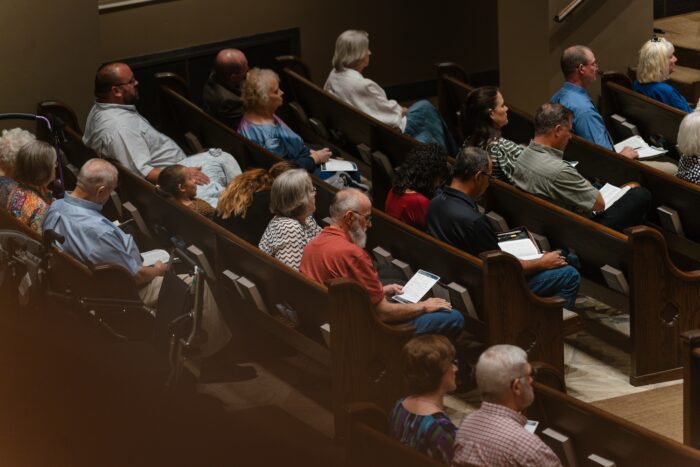Editor’s note: This year marks the centennial anniversaries of the Cooperative Program’s creation, the adoption of the Baptist Faith & Message, and the SBC’s ownership of Southwestern Seminary. To celebrate these 100 years of Southern Baptist cooperation, Southwestern has compiled eleven essays from key Southern Baptist leaders and seminary faculty for an original series on the ETC blog. The entire series, which will publish over the course of eleven weeks, will be available here.
The following essay by L. R. Scarborough is combined from two entries in The L. R. Scarborough Treasury, Revised and Expanded, which will be released in June at the Southern Baptist Convention annual meeting in Dallas. The essay was among several previously unpublished articles written by Scarborough, second president of Southwestern Baptist Theological Seminary, drawn from the seminary’s archives.
In his essay, “Is Cooperation a New Testament Doctrine?”, Scarborough argues for inclusion of the topic of cooperation in a future Baptist statement of faith, which no previous Baptist confession had included. “Article 19 On Cooperation,” is Scarborough’s draft of such a new article.
Given the reference to the ongoing 75 Million Campaign, these pieces would have been written between 1919 and 1924. The seminary’s doctrinal statement during this time was the New Hampshire Confession of Faith, which contained 18 articles. In 1925, the Southern Baptist Convention adopted for the first time a confessional statement, the Baptist Faith and Message, a revision of the New Hampshire Confession. The new statement was recommended by a committee of five men, including Scarborough. Among the articles in the BF&M was “Article XXII: On Co-Operation.”
Certain styles and spelling of words are retained from the original essays. The L. R. Scarborough Treasury, Revised and Expanded, is a collection of some of Scarborough’s most important articles, addresses, and books, including Recruits for World Conquests, With Christ After the Lost, and My Conception of the Gospel Ministry.
About 100 years after these essays were written, Scarborough’s thoughts on cooperation remain relevant to Southern Baptists today, especially during the centennial anniversary of the Cooperative Program.
The word “cooperation” means “working together.” In the Scriptural sense it means working together in carrying out Christ’s world-will. It is a triangular doctrine. It has three sides, each supporting the other.
God’s Side
God’s side of this triangular doctrine has two sides, inside and outside. The three persons in the Godhead work together with each other in proposing, preferring and promoting God’s world-program of redemption. The Father gave His Son to die, His Spirit to administer and apply salvation and put over His Kingdom. The Son “emptied Himself,” gave His soul an offering for sin. The Holy Spirit obeying the Father’s will took the task at Pentecost and carries it on today and will until the marriage supper of the Lamb and His Holy ecclesia – the Bride. These three are one in plan, purpose, and work – a holy symphony of glorious cooperation. Not only do the Three in One work with one another in unbroken harmony and fellowship but they work with saved humanity in carrying out and forward their will in our task committed to us in the Gospel’s trusteeship. “I am with you,” “In you,” “before you,” “behind you,” “for you,” “through you,” “by your side,” “holding your hand,” “even to the end,” are words ringing their triumphant and meaningful message to cheer, comfort, and victory throughout every page of God’s Word. God does not want to go alone without us nor does He want us to go alone without Him in this the biggest task of the centuries. His cooperation with us is the stimulating hope of every hour of the way and the guarantee of success in all of our difficulties and tasks. This Divine aide constitutes the base of our triangular doctrine of cooperation.
The Church Member’s Side
The individual church member in the New Testament is a big somebody. He is God’s spiritual unit in His conquering army. He lays much stress on him, his character, his obedience, his pliableness, his spirit, his obligation, his duties. He isn’t a separate isolated unit. He is a social unit. He is the basal factor for God’s multiplication table. He has vital means of connection and association. He has two spiritual hands, one to reach up for God and one to reach out for his brother church member and thus by this divine and human reinforcement to carry forward the tasks of Christ’s Kingdom. This unity of labor in a mutual love and common fellowship, facing Godward and manward is essential, fundamental and obligatory upon each church member. This church member has some liberties and large freedom but all of his freedom is bounded and limited by the world-will of Christ. He has no option when he faces Christ’s command. He has no option in baptism. Christ does not request us to follow Him in baptism after we trust His grace for salvation. He commands us. All of our liberties as Christians are within the circle of Christ’s eternal and sovereign Lordship. Is not cooperation one of these “command obligations”? Can a church member refuse to join with this fellow church member in a plain command of Christ in carrying the Gospel to all the world and justly plead an alibi and a justifiable defense and exemption on the ground of his freedom and personal liberties? This is anarchy in Christ’s Kingdom. It is willful and inexcusable disobedience. Our duty to cooperate in Christ’s churches in carrying out His world commands is not only a glorious privilege but it is an imperative obligation in which we have no option. The call and ordination of the Twelve, the Seventy, the imperative commands of Christ’s commission, all the remarkable precepts and examples of the apostle history bear impressive testimony to the correctness of this position that cooperation under the Lordship of Christ is a New Testament doctrine and that our voluntary response in full length services determines the quality and quantity of obedience to Jesus Christ.
The Local Church Side
Not only is there a divine side, an individual side, but also a church side, a corporate side of this primal and basal doctrine of cooperation. The individual with all of his freedom in Christ, under Christ’s world-will, is the unit in Christ’s churches and his local churches are His spiritual, ecclesiastical units in His universal Kingdom. The hope, power, and efficiency of the local church depend on the willingness of the individual member to cooperate with the other members in carrying out Christ’s commands. Everyone who halts or balks just that far hinders and blocks the power of the churches. A church whose member will not cooperate in the work of the church is worse than dead – it is a spiritual nuisance and a positive menace to the cause, and has no right to “cumber the ground.” Now as the program and power of the local church depend on the doctrine of cooperation on God’s and the church member’s side, so the presence and power of the earth-wide Kingdom of Christ’s depend on the cooperation of churches of like faith and order. There is as much necessity for churches to cooperate as there is for church members to cooperate. Here lies the hope of effective unseen in taking the world for Christ. The so called “Gospel Mission Plan” has two defeats. It is neither Gospel, nor missional neither sound in principle nor efficient in plan. It is essentially, selfish and narrow, and positively weak and ineffective in accomplishment. It does not recognize the doctrine of church-separation so clearly taught in the New Testament both in the commands of Christ and the example of the apostles as they were led by the Holy Spirit.
Unity in doctrine, in spirit, in faith and practice essentially demand unity in labor and effort. The Commission of Christ, the earthly ministry of Christ, the missionary record of Paul among the churches, the message of the Acts of the Apostles, and the epistles and the very heart of the ministry of the Holy Spirit, these all, teach with mighty power this great doctrine of cooperation between churches and all the agencies of these churches.
This doctrine does not embarrass nor contravene the freedom of this individual nor the sovereignty or independence of the local churches, if we remember that all of our freedom and sovereignty is to function within the circle of Christ’s Lordship and under the authority of His world-will. Any Baptist who says an individual church member or a local church has a right to do as he or it pleases in the world-program of Christ has Bolshevism in his thinking. All of our rights are subject to the limitations of Christ’s will.
The successful propagation of all the other doctrines of the Scriptures depends on the successful operation of this triangular doctrine of cooperation.
A New Article of Faith
This doctrine of cooperation is scarcely if at all hinted at in any expression of Baptist faith this side the New Testament. I have read 29 different expressions of faith given to the world by Ana-Baptists, Mennonites, English Baptists, American Baptists, German, French and Swedish Baptists. This doctrine as such has no clear pronouncement in any of them. It should have. I propose to the committee to be appointed by Northern and Southern Baptists and a new expression of our articles of faith that is put in Article XIX – on Cooperation. It should be so worded as to care for and properly guard our “individual freedom” and our “church sovereignty” – but it should be so set out as to mark a line of separation between our cooperant, and cooperating individuals and churches and those who oppose, hinder, criticize and block the mighty missionary, educational and benevolent progress of our people who feel the pressure on their consciences “to carry on,” “go forward” to the uttermost parts of the world. It is presupposed in all I say in the shore that the programs and movements in carrying forward Christ’s work that these programs shall be determined on by representations from the great case of our cooperating churches and on the basis of absolute loyalty to all the other doctrines, principles and policies laid down for Christ’s churches in the New Testament. No individual church member or local church has any right to cooperate in any movement that clearly seeks to dethrone Christ, vitiate His teachings, or emasculate His churches. God Himself will not cooperate with the devil nor should we cooperate to put over anything the devil wants done. But we have no option in carrying out Christ’s will. His “must” binds us at this point.
The 75 Million Campaign and all of our campaigns stake their all on the successful operation of this doctrine among the churches and people called Baptists.
Let’s go Christ’s way, on, in, out.
Article 19 On Cooperation
We believe in the doctrine and practice of co-operation in carrying out and forward the world-will of Jesus Christ as set out in the New Testament and in the leadership of His Spirit in the hearts and plans of His people. We believe that the individual members should co-operate with each other in the church in the support of the local ministry of preaching, teaching, benevolence, soul-winning and community building as decided on by the local church as it is led by the Spirit of God, and in the larger Gospel matters of the Kingdom of Christ unto the uttermost parts of the world. Every member of a Baptist church is in conscience bound by the commands and precepts of Christ to co-operate with time, talent and money with his fellow church members in giving the gospel of salvation and service to every creature of all nations. This comprehends evangelism, missions, Christian education and benevolence. We believe that this doctrine of co-operation also extends from the individual in a local church with each other to the co-operation of churches of like faith and practice with each other in carrying out the Gospel program of Christ in world-wide redemption. We claim this doctrine is fundamental and essential to full obedience to the world-will of Christ and is not a matter of option with any individual or church; but is included in obedience to the Lordship of Christ and is a part of the obligation put on us in our salvation and church membership. We have no more option in this than in the matter of baptism. This is not to be interpreted as a condition of salvation, but as a condition of acceptable obedience to Christ’s will in our service to Him. This doctrine is not to be interpreted as contravening or interfering with the freedom of conscience of the individual, not to the sovereignty and independence of the local church.
The liberties of the individual and of the local church are all limited and bounded by the will of Christ as set out in the New Testament. The individual is free and the church sovereign only under the will of Christ. We believe that co-operation in carrying out Christ’s Gospel will in the earth is a New Testament limitation to our freedom and the independence of the churches put on us by the commands and Lordship of Christ.








